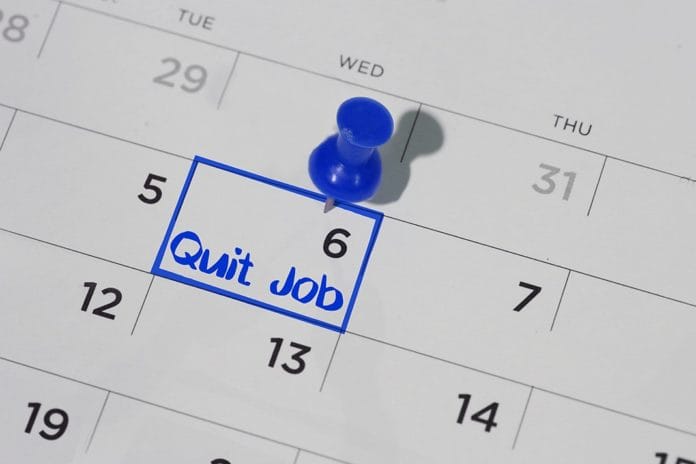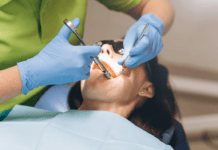We are in a new decade, in case you haven’t heard, which by the way, is debatable as some say the decade begins in 2021. That would be helpful to alleviate all this pressure, wouldn’t it? The voice of reinvention is loud – Be bold! Move on! All this forward-thinking can be the catalyst to begin a new future, both personally and in business.
If leaving a job is on your to-do list, going to greener pastures is exciting. But leaving a position is never easy, especially in smaller dental practices. We may not have the luxury of going to HR, handing in resignation, and making it through the two weeks hidden in a cubicle or private office. I, for one, struggle with confrontation (contrary to what people may think about me) and have stayed in places too long because I couldn’t say “I quit.” Monster.com equates quitting a job to breaking up with a partner – it can be upsetting for some or elating for others.
The first thing is to always stop and consider: Are you sure you want to leave? We’ve all had bad days, bad weeks, and sometimes even bad months. During my 50-plus years of life, I have learned that acting on impulse in the business sector often leads to regret. Impulsive decisions can burn bridges, which in our small dental community will usually not bode well for the future.
Employee Benefits
Now let’s now talk employee benefits. I know, I know. Most of you just spit out your drink. Benefits didn’t happen often for me either in a small practice. But if you’re one of the lucky ones who do get any kind of benefits, know what you are entitled to before you quit. Unused vacation or sick pay may suddenly disappear.
Or if you have a 401k plan, you’ll need to know how to roll it over. Don’t act impulsively here either, or it may result in losing the benefits you’ve worked so hard for.
Notification
After you’ve evaluated the pros and cons and you’re sure you want to hit the bricks, it’s difficult to know the best way to pull the plug. Do you write a letter of resignation? Or is an email, phone call, or text more appropriate? Texting, in my opinion, is a ridiculous idea, but it is being done from what I understand.
While a short and sweet hand-delivered letter is probably the best way to go, I’ve done my fair share of dropping it on the boss’s lap at 5 p.m. on a Thursday. I think writing a letter of resignation delivered with an approximate two weeks of notice opens the door to the possibility of getting a good reference letter. While we don’t often use this type of reference in dentistry, having one or two has come in handy for me.
Explanation
So, what do you say in your letter or in person? The best answer is not much of anything other than that you are leaving – less is usually more. Offer to help during the transition, and while there are many circumstances you obviously can’t change, you should always try your best to take the high road and make things as easy as possible.
Above all, try not to be negative. There most likely won’t be any major changes to the practice if you decide to do a diatribe on all the horrible parts of the office. If you have any criticism, make sure you constructively portray them.
In our world, exit interviews don’t happen often, which is sometimes a blessing. Some larger practices, though, incorporate them into the process. Unfortunately, even during exit interviews, most of the details and nitty-gritty information will never get to the parties who can make a difference anyway. So, make sure to guard your words accordingly.
Serving the Notice
When you give notice, prepare for the worst. I’m not trying to be a negative Nancy, but you need to be realistic about the situation. No matter how torturous the position, I’ve always given my two weeks’ notice and prepared to stick it out until the end.
However, the first time an employer said, “Today will be your last day,” I was mortified! Here I was thinking, “I did this the right way. What in the heck happened?”
Sometimes employers get their feelings hurt by your leaving. They are insulted or frankly aghast you’d want something more than they offer. They have no problem with proverbially cutting off your nose to spite your face. It isn’t like we need to be escorted out because of “trade secrets” for heaven’s sake, even though I thought that might be coming when I heard that “today is your last day” comment.
When I say prepare for the worst, I mean it. An employer usually has the right to say adios as long as they are not discriminating based on a protected category. Before you announce your departure, be sure to plan and sock away some money if you can, especially if you suspect your new position can’t take you on early or if you can’t score some temp days somewhere else.
On Good Terms
When I spoke about burning bridges, this is from firsthand experience and is not a good idea, no matter the circumstances. Way back in the day, I worked for a full-on whack-a-doodle. I can’t get into specifics for my protection, but let’s just say they don’t have their dental license anymore. I had to return to that office after I quit to get a letter from them in order to get a hygiene license in another state. It was a torturous experience, and I had to do a fair bit of crow eating and back paddling to make it happen.
In another case, the first hygiene job I left was probably the scariest of all. I was young and had no real-world experience in quitting. He wasn’t happy, and thankfully I was scared enough to not pop off and say something stupid. I ended up working for him on and off for over 30 years. He became my mentor and friend and one of the best teachers I have ever known.
If I would have said things I regretted when I first quit, I would have missed one of the best career relationships of my life. You never know where life is going to take you, and taking the high road is always the right thing to do, no matter how frustrated you are.
Finally, be on your best behavior. Return company property, say a gracious farewell, and absolutely don’t air any dirty laundry after you’ve split. I’ve been in a few practices that went on lock-down after a departing employee left and didn’t return their keys, so be kind to the remaining survivors. This job might not be the end-all-be-all for you, but for some, they’ll be there until retirement. Make things easy on them by leaving with grace.
Don’t post to social media anything negative about the position. Again, just because it’s not a fit for you doesn’t mean that someone else wouldn’t give an arm or leg for the position. We are living in crazy times. It never has and never will be good a good idea to air your grievances online by posting disparaging comments about a previous employer or anyone else for that matter. It makes you appear worse than the person/company than you’re posting about and can be a huge red flag to future employers.
I sound so much like my mother; “If you don’t have anything nice to say, then don’t say anything.” But she’s 90 and the wisest person I have ever known. Here’s to a new year full of positive changes for your career.
Before you leave, check out the Today’s RDH self-study CE courses. All courses are peer-reviewed and non-sponsored to focus solely on pure education. Click here now.
Listen to the Today’s RDH Dental Hygiene Podcast Below:












